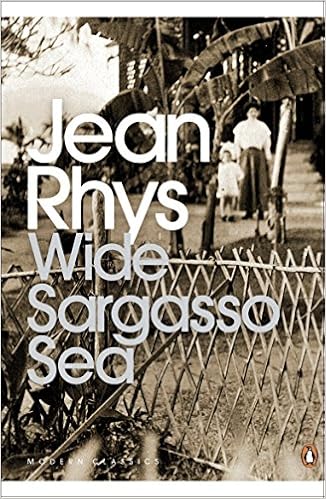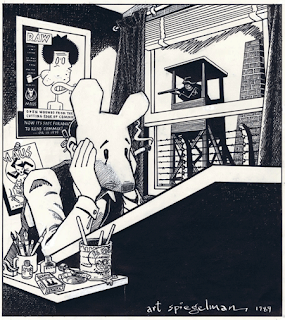OF MADWOMEN AND ATTICS
Last year, one of the posts of this blog dealt with Charlotte Brontë's novel Jane Eyre. I hope that short article encouraged some of you to read the book. Today, I would like to expand on its influence. This 1847 novel introduced, apart from the eponymous heroine, a secondary character that was the basis for another influential book. In the original, Jane becomes the second wife of Mr Rochester. We are told in Brontë's pages that Bertha Mason, Rochester's first wife, is violently insane and locked in a room on the third floor of the house. However, her depiction leaves many questions unsolved about her past and this sparked the interest of a great female novelist, Jean Rhys, who placed Bertha at the centre of her masterpiece Wide Sargasso Sea (1966).
It is a feminist
and anti-colonial response to Brontë's novel, describing the background to Mr
Rochester's marriage from the point-of-view of his mad wife, a Creole heiress.
Antoinette Cosway (Bertha's maiden name) is Rhys' version of Brontë's devilish
"madwoman in the attic". Antoinette's story is told from the time of
her youth in Jamaica, to her unhappy marriage to a certain unnamed English
gentleman, who renames her Bertha, declares her mad, and takes her to England.
Antoinette is caught in an oppressive patriarchal society in which she fully
belongs neither to Europe nor to Jamaica. Wide Sargasso Sea explores the power
of relationships between men and women and develops postcolonial themes, such
as racism, displacement, assimilation and women's subjugation in our society.
While
recounting the story of her life, Antoinette portrays her relationship with
Rochester under tremendously hostile circumstances, her past as member of a
family of impoverished former slave owners and the weight of colonialism in
British past, not fully acknowledged even today. Since we live in a world that
is constantly re-examining current relations of power and the importance of
equality, Wide Sargasso Sea makes up for an excellent reading.
Unha das entradas do
ano pasado versaba sobre Jane Eyre, novela de Charlotte Brontë. Espero que
aquel post tivese animado a moitos de vós a ler a obra. Hoxe gustaríame ampliar
algo máis ese artigo e falarvos da influencia que tivo. A novela —escrita en
1847— presentaba, ademais da protagonista que dá título ao libro, a un personaxe secundario na que se baseou outro libro moi influínte. Na composta
por Brontë, Jane convértese na segunda muller do Sr. Rochester e, nas súas
páxinas, descubrimos que Bertha Mason, a primeira muller de Rochester, está
confinada no terceiro andar da casa polos seus problemas de saúde mental e
conseguintes episodios de violencia. Porén, o retrato que dela se fai deixa moitas
cuestións sen resolver acerca do seu pasado e condición, aspecto que promoveu o
interese doutra importante novelista posterior, Jean Rhys, que situou a Bertha
no epicentro da súa obra mestra, Ancho Mar dos Sargazos.
Esta é unha resposta
feminista e anticolonial á novela de Brontë, traballo no que describe o pasado
do primeiro matrimonio de Rochester dende o punto de vista da súa esposa louca,
unha herdeira crioula. Antoinette Cosway (o nome de solteira de Bertha) é a
versión de Rhys sobre o tema da «tola no faiado». A historia de Antoinette desenvólvese,
comezando pola súa mocidade en Xamaica e abranguendo o seu desposorio cun
xentilhome inglés, que lle muda o nome a Bertha, trátaa como a unha chalada e
lévaa a Inglaterra. Antoinette vese atrapada pola opresión dunha sociedade
patriarcal na que non pertence nin a Europa nin a Xamaica. Ancho Mar dos
Sargazos explora as relacións de poder entre homes e muller e trata temas
poscoloniais, como o racismo, os desprazamentos e migracións forzosas, a asimilación
cultural e a subxugación das mulleres na sociedade.
Ao relatar o seu
percorrido vital, Antoinette describe a súa relación con Rochester, nacida en
circunstancias tremendamente hostís, o seu pasado como membro dunha familia escravista
vinda a menos e o peso do colonialismo no pasado británico, aínda non recoñecido
hoxe en día. Xa que vivimos nun mundo no que estamos constantemente a
reexaminar as relación de poder e a importancia da igualdade, Ancho Mar dos
Sargazos preséntasenos como unha lectura excelente.









Comentarios
Publicar un comentario